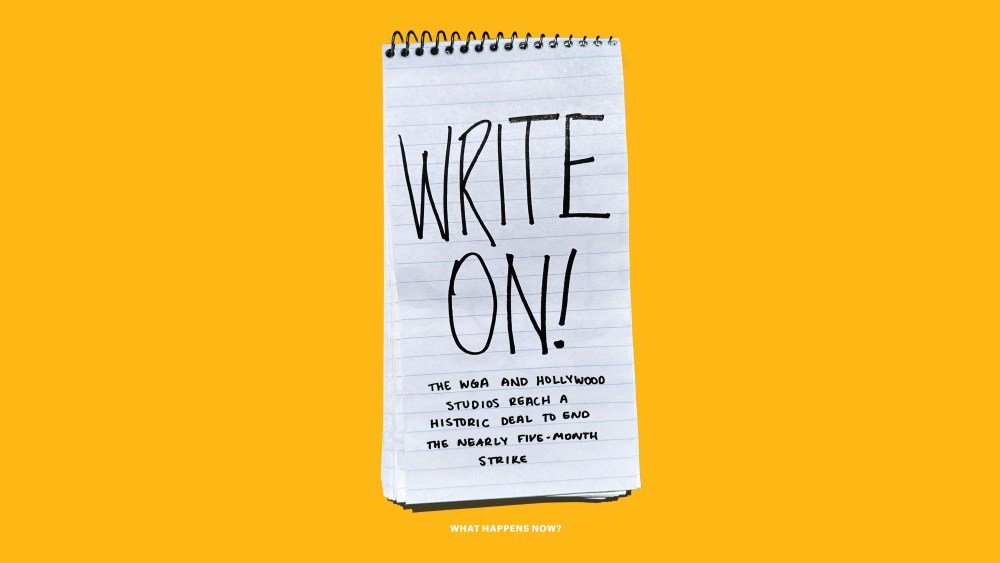
Hollywood heaves a sigh of relief. The WGA and major studios and streamers have reached a tentative agreement on a new three-year contract that promises to end the 146-day strike that has taken a heavy toll across the content industry.
Negotiators for the Writers Guild of America and Alliance of Motion Picture and Television Producers reached the finish line Sunday after four consecutive days of negotiations. Day 4 on Saturday mostly involved lawyers for the guild and AMPTP hashing out the fine print of language around complicated and groundbreaking additions to the WGA’s Minimum Basic Agreement. The nitty-gritty details of language around the use of generative AI in content production was one of the last items that the sides worked on before closing the pact.
The three-year contract will be sent to WGA members for a ratification vote. After nearly five months on strike – the work stoppage began May 2 – it’s highly likely to pass muster with the WGA’s 11,000 members, especially with the enthusiastic endorsement of WGA leaders. As momentum built this week, negotiators began to look at the approach of the Yom Kippur holiday on Sunday as a soft target deadline.
No doubt – the WGA prevailed in forcing Hollywood’s largest employers to address the guild’s major priorities in the first full-fledged contract negotiation since 2017 (the 2020 talks were hampered by the pandemic). The guild’s insistence in achieving a minimum guaranteed staff level for episodic TV was considered an extreme long-shot when the contract discussions began in March. The unwavering support of the vast majority of WGA members was the muscle that allowed the guild’s negotiating committee, led by Chris Keyser and David Goodman, to dig in on priority issues. They achieved a new-model streaming residual formula that should help fellow striking union SAG-AFTRA in its quest to achieve a revenue-based residual. The WGA’s formula amounts to a bonus system based on pre-determined, high-bar performance benchmarks for individual titles. But it’s nonetheless more than industry dealmakers predicted the guild would secure when the first round of WGA-AMPTP talks began in earnest last spring.
The end of the WGA strike will hasten the end of SAG-AFTRA’s walkout. It will also start the process of returning the creative community to its typical cycles of production, distribution, marketing and promotion cycle for content. Production of TV and film has been in state of turmoil since the start of the year when production slowed down in the face of the May 1 deadline set by the WGA’s contract expiration. It was no secret as early as last year that the 2023 round of guild contract negotiations would be challenging, given the level of structural change across TV and film.
Hollywood is eager to get back to work. But after a five-month pause in production, studios and streamers will need time to get shows and movies back on their feet. As word of progress at the negotiating table spread earlier this week, quiet planning for a return to production stepped up with producers and executives inquiring about the availability of stages and other production resources.
The terms of the tentative agreement have not been formally disclosed.
The sides returned to the bargaining table Sept. 20 after talks had stalled for a month. Four key Hollywood leaders participated in three days of marathon negotiations that finally broke the logjam. The executives: Disney’s Bob Iger, NBCUniversal’s Donna Langley, Netflix’s Ted Sarandos and David Zaslav of Warner Bros. Discovery.
The AMPTP first attempted to address the guild’s demands for a viewership residual and minimum staffing guarantee in a proposal on Aug. 11. The WGA maintained that the offer was riddled with loopholes and exceptions that made many of its provisions meaningless.
The AMPTP returned Sept. 20 with another set of proposals, which it hoped would break the logjam.
Once Labor Day came and went, WGA negotiating committee co-chairs Chris Keyser and David Goodman faced heightened internal pressure from some prominent members to restart the negotiations process. Now that a deal with the WGA is in hand, AMPTP negotiators will turn their attention to SAG-AFTRA, which has been on strike since July 14. Production and promotion cannot fully restart until SAG-AFTRA members vote to ratify a new agreement.
More to come













